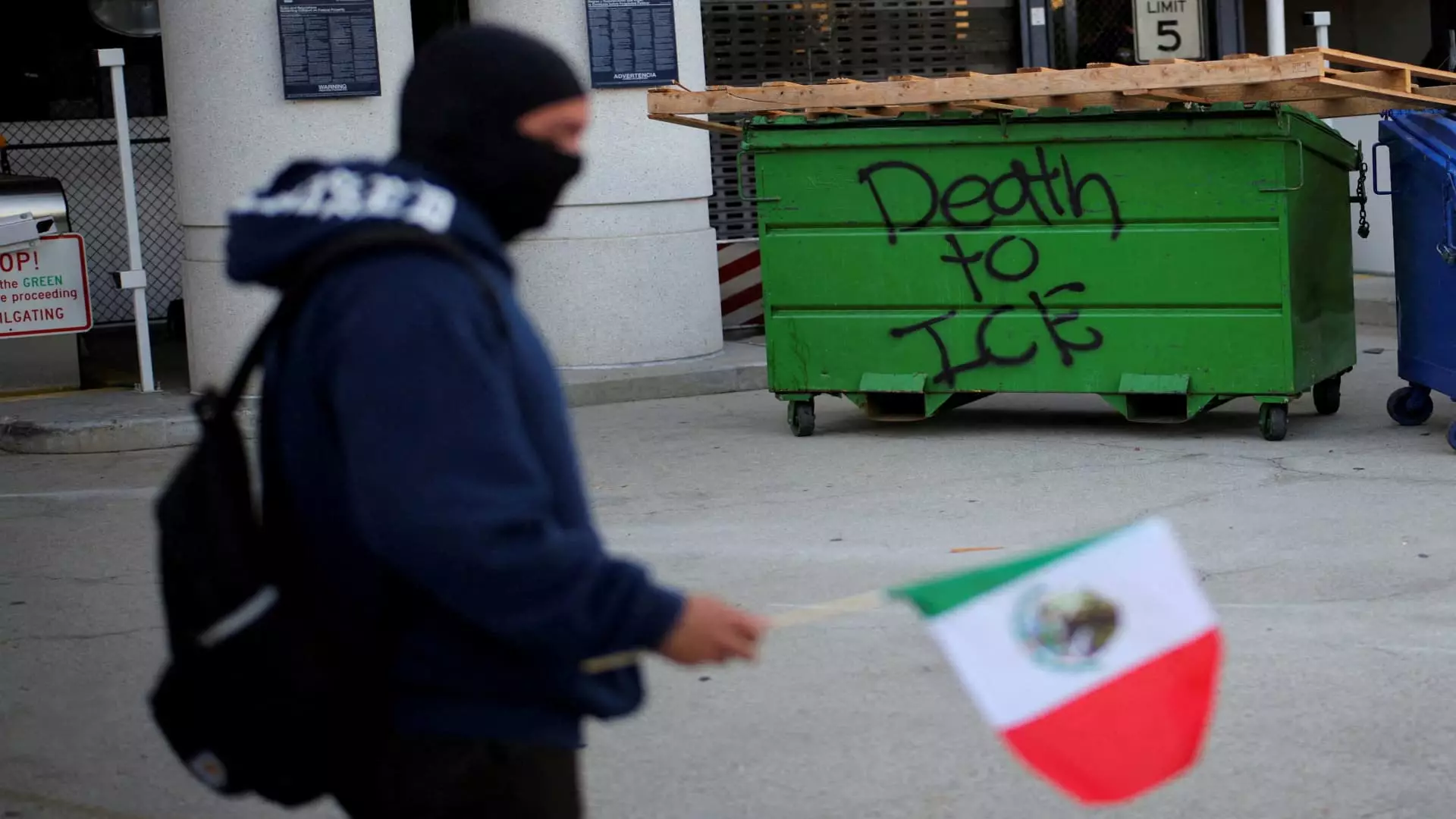The recent protests in Los Angeles revolve around a rapidly escalating conflict between community organizers and federal authorities regarding immigration enforcement. The spark ignited when Immigration and Customs Enforcement (ICE) agents conducted a series of raids across the city, resulting in the apprehension of at least 44 individuals for alleged immigration violations. This level of enforcement is not merely a local issue; it underscores a broader national discourse that often seems polarized and chaotic. Underneath this turmoil lies a community grappling with its identity, morality, and future.
The federal government, led by figures such as Stephen Miller, has adopted an aggressive stance, labeling the protests as insurrections against the nation’s immigration laws. This accusation may resonate with hardline advocates but appears devoid of the nuance required to tackle a complex societal issue. Calling peaceful demonstrations “insurrections” not only serves to delegitimize the grievances of concerned citizens but also fosters an environment of division and hostility that reaches beyond the immediate circumstances.
Tools of Division: Rhetoric and Enforcement
As federal agents dawned their tactical gear and descended upon neighborhoods with military-like precision, the optics of such a response could hardly be more dramatic. Videos emerged of demonstrators rallying in overwhelming numbers, some wielding Mexican flags and wearing masks, a proud assertion of identity in what many see as an act of oppression. This stark imagery captures the essence of a community at odds with its government—a government that seeks to portray dissent as criminality. It raises a critical question: When does enforcing law intersect with terrorizing a community?
Equally alarming is the language used by officials, including Assistant Secretary Tricia McLaughlin, who implicates local leaders in fostering an atmosphere conducive to violence against ICE agents. This feedback loop of rhetoric and enforcement creates a self-perpetuating cycle of fear, mistrust, and conflict. It’s a dangerous strategy to vilify dissent while failing to acknowledge the legitimate concerns and fears of immigrants, legal and undocumented alike, who contribute to the social fabric of America. This is not merely a governmental imperative; it is a moral obligation to comprehend the pain and struggles of marginalized groups.
The Role of Leadership in Crisis
Amidst the chaos, voices from the local leadership, such as Mayor Karen Bass, emerge to challenge this narrative. The mayor’s condemnation of the ICE raids reflects a significant divergence in values between the local population and the federal stance. She calls these tactics a disruption to safety and community well-being, alluding to a sense of dread that these operations instill within neighborhoods. This argument touches on a vital aspect of effective governance: leadership must focus on uniting communities and maintaining their safety rather than initiating conflicts.
In times like these, leadership roles can deeply influence societal outcomes, and Bass’s efforts to advocate for the rights and dignity of the people cannot be overlooked. Her framing of the situation as one affecting community safety encourages dialogue around the complexities of social justice and immigration. Striking a balance between upholding laws and protecting human dignity is paramount and should resonate with any center-left liberal approach toward governance.
The Consequences of Fear and Division
The federal government’s approach, branded as a relentless crackdown on illegal immigration, often inadvertently punishes those who have legal residency or are in processes of seeking it. The broader immigration reform needs to be addressed. Currently, it is in the shadows of hyperbolic political rhetoric that marginalizes human stories in favor of a stark narrative of law enforcement versus lawlessness. The need for bipartisan discussions on immigration policy, which prioritize humane treatment and legal pathways for citizenship, is urgent.
These protests are as much about immigration as they are about community values, identity, and human dignity. They catalyze conversations that challenge us to look beyond partisan lines and examine the social ramifications of policies framed in punitive terms. The community in Los Angeles, vibrant and diverse, is not only responding to government action; they are voicing a collective desire for respect, recognition, and a fair chance at the American dream—at a time when that dream seems increasingly precarious.
As the nation observes these developments, it is crucial to acknowledge that the method of enforcement is shaping societal attitudes—turning citizens into adversaries and fuelling division rather than unity, compassion, and understanding in a country that is often celebrated for its diversity.


Leave a Reply